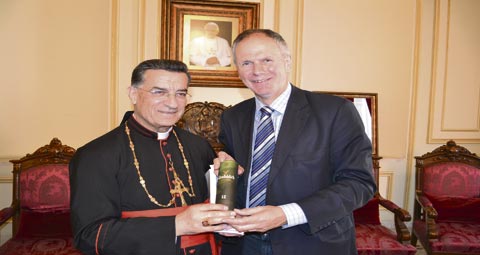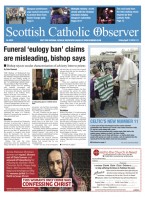July 29 | ![]() 0 COMMENTS
0 COMMENTS ![]() print
print

THE HILLS ARE alive with faith in Lebanon
— NEVILLE KYRKE-SMITH, UK director of Aid to the Church in Need, reflects and reports back on the situation for Christians in Lebanon and neighbouring countries after his recent visit to the region
We rounded a sharp bend in the road. “The military check point are always there,” my friend Kamal said. “Don’t worry.” The army looked at us, guns at the ready, standing by their armoured personnel carriers—this time we were waved through.
Here, high up in the mountains of Lebanon, a stronghold of Maronite Christianity remains. The villages and cave monasteries here bear testimony to an ancient Christianity: a fortress faith that has survived by taking refuge in the hills. Yet the threat of potential violence and conflict is never far away. Just over the mountains in nearby Syria, Christian and other communities fear for their very existence.
The tensions and threat of conflict are the day-to-day reality for so many Christians in the Middle East. The Arab Spring sprang in hope from discontent, oppression and the abuse of human rights. Summer has not blossomed, but instead violent mountain storms and suffering have broken out over much of the region. Christians told me, both in Lebanon and Palestine, of their deep fear and apprehension.
Driving down from the mountains through the dusty back streets of Tripoli—Trablous, north Lebanon—I passed the still war damaged and bullet-ridden buildings from the terrible war of 1975-90 in which perhaps 150,000 died. Now the black flags of the Sunnis hang across side streets proclaiming: ‘There is only one God—Allah,’ and ‘Mohammed is his Prophet.’ Passing some military posts I made my way to meet Archbishop Georges Abou Jaoudeh, Maronite Archbishop of Tripoli.
Archbishop Abou Jaoudeh explained the army presence in some of the streets. The continuing tension between Alawites—a group that came out of the Shi’a movement of Islam—and Sunnis in Tripoli reflects what is happening in Syria. There have also been some recent outbreaks of violence in which people have died, following major uprisings in the Palestinian refugee camps back in 2007 in which there were hundreds of army casualties on both sides.
Individual eye-witnesses also confirmed to me the horror of the recent uprising and fighting in parts of Syria. As there are about 1.5 million Christians in Syria, the Aarchbishop was particularly concerned about what could happen to them. The Christians have sheltered under the Alawite wing of the present embattled Assad regime and now have nowhere to flee to. Graffiti in some towns in Syria warns: ‘Alawites to the cemeteries. Christians to Beirut.’ Some help has been provided for refugees in northern Lebanon, whilst a number of Iraqi refugees have fled back from Syria to the relative safety of northern Iraq.
Archbishop Georges Abou Jaoudeh thanked ACN benefactors for their help for the priests in the mountain villages and our support in sustaining the Faith. “We are very grateful to you our faithful brothers for standing by us during the war and now, in the permanent problems we have here in the Middle East,” he said.
Cardinal Keith O’Brien spoke up earlier this year demanding that the British Government do more to act and safeguard religious freedom. In the Middle East the Christian communities fear that they are being forgotten, as they face oppression or persecution.
“There is a very critical situation here in the south of Lebanon, on the borders of Israel and the mountains,” Archbishop Chucrallah el Hajj, the Maronite Archbishop of Tyre (Sour) told me. “It is very delicate. Just one gunshot can set conflict off. There is uncertainty and instability.”
He went on: “This is also the Holy Land—and the heart is still beating, but please help us to stay here and stay alive. We need your solidarity for all Christians here… [for] we have no one but you. The presence of Christians here is a symbol of peace making and reconciliation with, and between, different religious communities. This is the Church of Hope.”
Bishop George Bakhouni, the Melkite Bishop in Tyre (Sour) added: “This is an area where every few years there is a war. We are on the borders of life… and it is difficult to keep the faith. We need support… spiritually and in prayer, we need your solidarity. This is so important.”
The engagement and work of Christian communities does make a difference. In Beirut I met Iraqi refugees, children who ran round their playground with the normal energy of the young, cared for with support from Aid to the Church in Need. Sisters working at an orphanage school were looking after the young from all communities. The Lebanese Franciscan Sisters of the Cross run a psychiatric hospital where all people are cared for, including those scarred and traumatised by years of conflict. I met both Sunnis and Shiites queuing to meet bishops to discuss local issues. And the hope of the Gospel is proclaimed to all on Christian television station Tele Lumière. This faith and action of Christian communities needs sustaining and encouraging—for they are the charitable bridge builders of hope.
“The situation is very critical in the Middle East – and no one knows where this political and social earthquake will lead us,” Patriarch Béchara Boutros Rai, Patriarch of the Marionite Church, in Beirut said. “We fear two things—either having fundamentalist regimes, or a partition of all the Arab countries into confessional states. Yet, we should always hope—and we Christians are the people of hope. We can never say that we are living in despair. And we are working so that hope can remain in the hearts of the people. As the saying goes—he owns the future who plants hope in the hearts of people.”
Pope Benedict XVI, issued a clarion call at the beginning of this year—in his Message for the World Day of Peace, January 1 2011. “I ask all Catholics for their prayers and support for their brethren in the faith who are victims of violence and intolerance,” the Pope said. “At present, Christians are the religious group which suffers most from persecution on account of its faith. Many Christians experience daily affronts and often live in fear because of their pursuit of truth, their faith in Jesus Christ and their heartfelt plea for respect for religious freedom.
“In the face of present difficulties, may Christ’s followers not lose heart, for witnessing to the Gospel is, and always will be, a sign of contradiction.”
Back up in the mountains, we stopped to look up at the Cedars of Lebanon—some of these huge trees are said to be thousands of years old. From these Solomon built and adorned the Temple in Jerusalem—and the remaining Cedars are a symbol of strength, beauty and endurance, ‘the Cedars of God’ as Gibran Khalil Gibran, author of The Prophet, called them. And the strength of faith and the hope of the people are symbolised in these trees.
In Scotland too often we lift up our eyes—the eyes of our souls—‘to the hills.’ And the answer to our question ‘from when does my help come?’ is the one we share with the faithful in the Middle East and all suffering Christians. We can look through the clouds and dreek with the eyes of faith, in confidence: “My help comes from the Lord, who made Heaven and earth.” (Psalm 120/1:2)
– www.acn.org.uk










